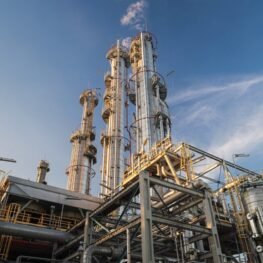Start
21/12/2025
End
01/01/2026
Address
Cairo- Egypt View mapCourse Description
- Rotating equipment, pressure vessels, aboveground atmospheric storage tanks, and piping systems represent major capital investment in any Gas Production operation.
Good design and construction is required as these equipment’s and piping systems are subject to a number of damage mechanisms throughout their service life that could result in serious or even catastrophic failures. Understanding the equipment is essential to excellent troubleshooting skills
The following are the highlights of the program:
- Design, operation and maintenance of rotating & static equipment
- Materials and construction
- System design integration & Equipment specification and management
- Problem Solving Terminology
- A standard “Blue-Print” for problem analysis and resolution
- Process Plant Troubleshooting & Engineering Problem Solving
- Strategies; Planning; and Protocols
- Variability Analysis
- “Human Factor” analysis as a Source of Error
Course Objectives
- To provide participants with the knowledge about the advanced Techniques used in well tests and how to Design Well Tests.
- Apply the requirements of the relevant industry standards and practices
- Understand the design and construction of rotating equipment
- Understand the design and construction of pressure vessels, piping systems, and aboveground atmospheric storage tanks
- Develop an understanding of codes, standards, and Recommended Practices in process plant equipment and piping system design, construction and maintenance.
- Develop a structured approach to Troubleshooting and Problem Solving which uses a common terminology and shared understanding
- Point the way to Continuous Improvement in the way you run your processes and make incremental efficiency gains
- Understand work practices which “allow” success in Troubleshooting and Problem Solving
- Enable the good management of plant systems
Who Should Attend
This seminar is designed for:
- Engineers
- Operations Engineers
- Maintenance Engineers
- Engineering Supervisors and Team Leaders to give them a practical understanding of real world situations in an oil and gas production environment.
- Employees who are responsible for leading and directing people to achieve and improve productivity levels
Training Methodology
This course combines sound engineering, operation and maintenance principles, applicable standards and best industry practices for reliable and cost-effective process plant systems. Delegates will be encouraged to introduce problems of their own for discussion and analysis. Copies of all lecture materials, case studies and workbooks will be provided.
Organizational Impact
Proper design and construction of new plant with appropriate specification would result in significant measurable improvements in process plant systems including: improved plant integrity, reliability and availability with fewer failures. Leading to:
- Improved plant integrity
- Improved equipment reliability
- Improved equipment availability
- Informed decision-making
- Better safety record
- Improved plant profitability
- Improved plant integration and operation.
Personal Impact
Delegates will enhance their competencies in the following areas:
- Oil & Gas Process plant design
- Knowledge of rotating equipment and static plant construction and design
- Commissioning, inspection & testing
- Knowledge of the requirements and application of relevant sections of the ASME Boiler and Pressure Vessel Code and B31 Piping Codes
- Management of reliability as applied to process plant
- Understanding of Consequences (Cause / Effect)
- Empowerment and a results driven focus
Course Topics:
I: Operation, Diagnostics and Maintenance of Equipment for Oil & Gas Production
Day 1: Rotating Equipment
- Pumps & Compressors
- Positive displacement
- Centrifugal action
- Pump & Compressor Performance
- Pump curves
- Compressor maps
- System curves
- Selection & Specification
- Fulfilling process requirements
- System integration
Day 2: Static Plant
- Piping, Pipelines & Pressure Vessels
- ASME B31 codes for piping
- ASME BPVC VIII for pressure vessels
- Pressure relieving devices
- Above Ground Storage Tanks
- API 650 for ASTs
- AST construction
- General Construction Considerations
- Fabrication techniques
- Resource logistics
- Working with contractors
Day 3: Materials & Construction
- Material Properties
- Physical properties
- Testing
- Material specification data
- Welding
- Techniques
- Qualification & procedures
- Approval & quality
- Inspection & Testing
- NDE techniques: VT, PT, ET, MP, RT, UT
- NDT techniques: hydrotest & pneumatic test
Day 4: System Design
- Process Flow Schemes & Process Engineering Flow Schemes
- Overview
- DEP requirements
- Process design & instrumentation
- Commissioning
- Preparatory checks
- Protocol development
- Startup/Shutdown/Handover
- Plant & Equipment Operability
- Operations consideration
- Maintenance considerations
Day 5: Specifications
- Procurement Requirements
- Material & Performance specifications
- Supporting Standards: regulatory & in-house
- Project schedule
- Measure the Success
- KPIs for the mechanical engineer
- Benchmarking
II: Process Plant Troubleshooting & Engineering Problem Solving
Day 6: Introductory Concepts
- The nature of problems
- A Common Terminology
- Context – Asset based or Business Process based
- Structured approaches – 6 Big Losses, 7 Wastes
- Techniques introduction
- Tools introduction
- A Six Level Performance Standard
- Critical Relationships
Day 7: Tools & Techniques – Practical Experience
- Decision Logic
- Maturity Indexing
- Relationships Analysis
- Problem Analysis and Synthesis
- Practical Use of Tools and Techniques
- Case Studies
- Project selection methods
- Tools & Techniques – selecting the right one
Day 8: People Issues
- Working practices – empowerment or impairment?
- Group dynamics
- Individual motivators
- External vs. Internal Motivation
- Developing Troubleshooting and Problem-Solving skills
- Managing change
- Transition Matrix
- Frictation
Day 9: Operator, Maintainer, Designer Interface
- Cross functional working
- Effect of Maintenance strategy
- Functional Contribution analysis
- Life Cycle Analysis, Design for Operation, Design for Maintenance
- Variability Analysis
- Strategies; Planning; and Protocols
- Effect of improved “Fit” between critical parameters in Operations
- Continuous Improvement
Day 10: Open Forum
- Review of Concepts, Tools and Techniques
- Your Problems – Your Case Studies
- Your Action Plan
- Configuration Management
- Commercial Programs
- Application of “Standard Questions”
- The Four critical stages of Data Maturity
